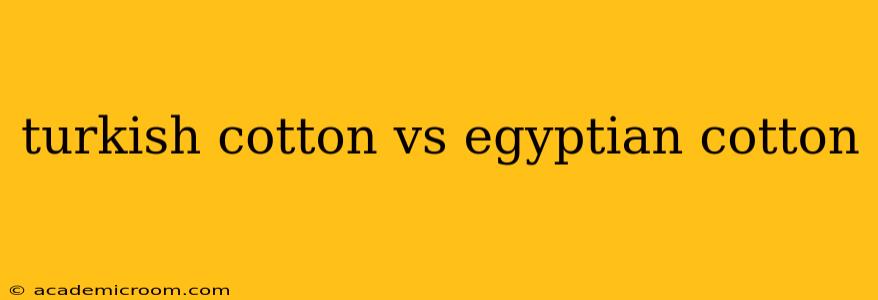Choosing the right bedding can transform your sleep experience. Two names frequently top the luxury bedding lists: Turkish cotton and Egyptian cotton. But what truly sets them apart? This in-depth comparison explores the key differences, helping you make an informed decision based on your needs and preferences.
What Makes Egyptian Cotton So Famous?
Egyptian cotton's reputation is built on its exceptionally long staple fibers. These longer fibers (typically exceeding 1 1/8 inches) contribute to its renowned softness, strength, and durability. The longer the staple, the smoother the yarn, resulting in a luxurious feel and a fabric that’s less prone to pilling. This superior fiber quality is why Egyptian cotton bedding often commands a higher price. However, "Egyptian cotton" is a term that isn't strictly regulated, leading to variations in quality. Look for certifications to ensure authenticity.
Understanding Turkish Cotton's Appeal
Turkish cotton, while not as widely known as its Egyptian counterpart, is a strong contender in the luxury bedding market. Its success stems from its exceptional softness and absorbency. While the staple length might be slightly shorter than some Egyptian cotton varieties, Turkish cotton often undergoes specialized combing and spinning processes to create exceptionally fine yarns. This results in a fabric that’s surprisingly smooth and durable, sometimes even surpassing the softness of lower-grade Egyptian cotton. The price point often makes it a more accessible luxury option.
What's the Difference in Thread Count?
High thread count often equals softness and durability, but it's not the only factor. While both Turkish and Egyptian cotton can be woven into high-thread-count sheets, the quality of the fiber itself is paramount. A high thread count from short-staple cotton will likely feel rougher than a lower thread count made from long-staple cotton. Focus on the quality of the cotton, and the thread count will be a secondary consideration for optimal softness and durability.
How Do They Compare in Terms of Durability?
Both Egyptian and Turkish cotton are known for their durability, but subtle differences exist. Egyptian cotton's longer fibers generally translate to slightly greater strength and resistance to wear and tear. However, properly processed Turkish cotton, particularly with its superior spinning techniques, can achieve comparable durability. The key is to look for reputable brands and higher-quality constructions within each type of cotton.
Which Type is More Absorbent?
Both Egyptian and Turkish cotton are highly absorbent, but Turkish cotton often edges out slightly in this category. This increased absorbency can contribute to a cooler and drier sleep experience, making it a popular choice for those who sleep hot.
What About Price?
Generally, Egyptian cotton commands a higher price point due to its reputation and the associated cost of production. However, Turkish cotton offers a more budget-friendly alternative without sacrificing significant quality. The price difference can vary greatly depending on the brand, quality of the cotton, and the manufacturing processes involved.
Is One Better Than the Other?
There’s no single "better" option; it truly depends on your individual priorities and budget. If you prioritize the ultimate softness and are willing to pay a premium, high-quality Egyptian cotton might be your preferred choice. If you want exceptional softness and absorbency at a more accessible price, Turkish cotton is an excellent alternative that offers incredible value.
Where Can I Find Authentic Turkish and Egyptian Cotton?
Reputable brands usually provide certifications and details about their sourcing to ensure the authenticity of their cotton. Always read product descriptions carefully and look for detailed information on the origin and processing of the cotton.
How Can I Tell if My Sheets Are Truly Egyptian or Turkish Cotton?
Look for certifications and detailed information from the manufacturer. Authenticity is paramount, and transparency in sourcing and processing should be a key consideration. Be wary of claims that lack supporting evidence.
Ultimately, the best way to decide between Turkish and Egyptian cotton is to consider your budget, preferences for softness, absorbency, and durability. Reading reviews from verified purchasers can help you gauge the quality of specific brands and products.
